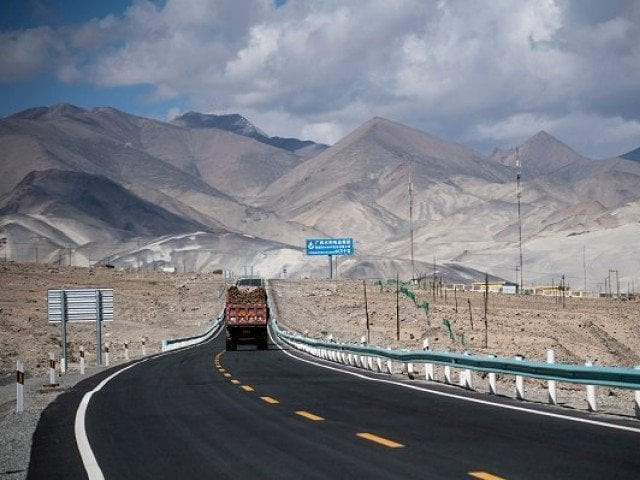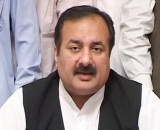IPR chairman advises review of current macroeconomic policies
SAPM on national security says the govt's focus is on completion of CPEC

CPEC. PHOTO: REUTERS/FILE
Khan, a former commerce minister and the Pakistan Tehreek-e-Insaf's (PTI) ticket holder, advised to review the current macroeconomic policies that according to a study conducted by his policy institute were not contributing to macroeconomic stability.
His word of caution is likely to fall on deaf ears as the State Bank of Pakistan (SBP) was jubilant about $1.54 billion inflows in the government's debt, commonly known as hot foreign money.
He said that short-term portfolio inflows should not be celebrated as these create problems instead of providing solutions.
In order to attract hot money, the central bank has kept the key policy at 13.25%, which has significantly increased the cost of the debt servicing of the federal government.
'CPEC projects completed or near completion'
Khan shared the key recommendation of the IPR study in an event attended by the Chinese Ambassador to Pakistan Yao Jing, and Special Assistant to Prime Minister on National Security Moeed Yusuf.
"Pakistan must stop incurring foreign debt for budget financing and balance of payments and review its strategy to build foreign exchange reserves through portfolio investment," said Khan.
"Since 2000, only 38% of the total foreign loans were obtained in the project mode and rest were taken for budget financing and balance of payments support."
He said that Pakistan's debt was growing at twice the rate of GDP growth, which was quite an alarming situation.
He also advised to review all the imports and replace some of them with local substitution aimed at addressing the country's external sector problems.
The loss-making enterprises should also be either revived or privatised and the government should stop giving taxpayers' money to finance their losses.
The development of financial institutions must be activated for industrial development.
"Macroeconomic stability cannot be achieved through short-term measures and steps have to be taken for sustainable long-term economic growth. Pakistan must change its governance paradigm for macroeconomic stability," said Khan.
"Exports used to be sensitive to the exchange rate but even this is not happening now."
Yao Jing, the Chinese Ambassador to Pakistan, also emphasised upon the need of thinking about long-term policies. He said that the second phase of the China-Pakistan Economic Corridor (CPEC) could provide a solid base for economic sustainability in Pakistan.
The Chinese ambassador said that the fundamental change between the first and second phase was that under the second phase there will be more focus on private sector participation, building Pakistan's capacity to enhance exports and focus on investment in Balochistan.
"In October last year, Prime Minister Imran Khan said that Pakistan's economy had stabilised and the second phase of CPEC could be launched," said the ambassador, adding that during the second phase of CPEC, the focus will be on industrial cooperation and agriculture development.
He said that Pakistan and China can enter into joint ventures, but the ambassador said that the Special Economic Zones were not moving very fast. He said that China was currently working to develop four SEZs in Faisalabad, Islamabad, Nowshera and Dhabeji, Sindh and that at this stage the Chinese companies were reluctant to invest in minerals.
The ambassador said that Pakistani and Chinese experts had difference of opinion about Pakistan's electricity demand.
Past five years of CPEC in review
"According to Chinese experts, the current power generation capacity was sufficient to meet the country's needs until 2025. However, Pakistani authorities wanted to install more power plants," he added.
Special Assistant to Prime Minister on National Security Moeed Yousaf said that the core purpose of CPEC was economic and there were no security strings attached with it. He said that the government's entire focus was how to get CPEC projects done and make CPEC a source of sustainable economic growth.
Yusuf said that Imran Khan's government was also working to develop an economic diplomacy strategy. The government wanted to make the strategy functional within this year. He said that there will not be any compromise on hard security but at the same time the country should have economic diplomacy for enhancing exports, trade in services, promoting tourism and culture.



















COMMENTS
Comments are moderated and generally will be posted if they are on-topic and not abusive.
For more information, please see our Comments FAQ